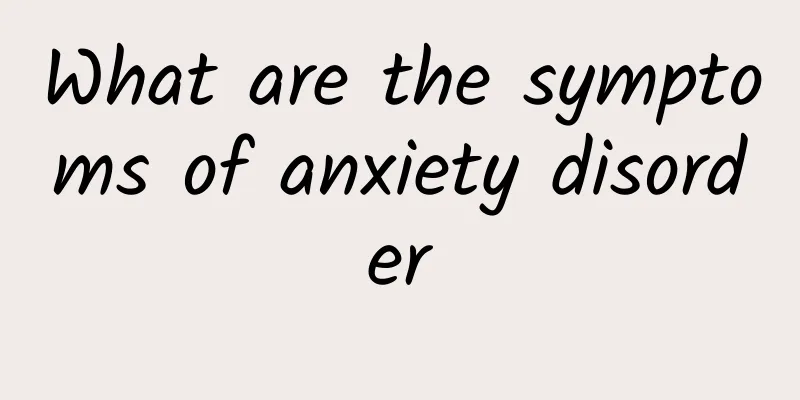What are the symptoms of anxiety disorder

|
There are many symptoms of anxiety disorder. Psychological anxiety problems often lead to physical discomfort, which is a common symptom of anxiety disorder. For example, the heart rate may accelerate, causing chest tightness and shortness of breath, frequent urination and urgency, which often leads to a decline in the ability to work and live, sleep disorders, insomnia, pain, and autonomic nervous system dysfunction. The main symptoms of anxiety disorders are: Symptom 1: Physical symptoms. This is a common early symptom in people with anxiety disorders. During the progression of the disease, it is usually accompanied by palpitations, heart palpitations, chest tightness, shortness of breath, frequent urination, dizziness, fear, fainting, heart pain, increased heart rate and breathing, and general fatigue. In severe cases, irregular menstruation, amenorrhea, and decreased libido may occur. Symptom 2: Decreased ability to live and work. The vast majority of anxiety patients also experience hand tremors, finger tremors or numbness, making simple daily housework difficult and impossible to do. Such symptoms, in turn, increase the patient's worry and anxiety. Symptom three: Sleep disorders. This is the most common symptom of anxiety disorder, often accompanied by anxious feelings, frequent nightmares, or easy awakening. Some patients snore loudly at night, and after waking up they feel they have not slept all night and lack sleep. Symptom 4: Emotional anxiety. Characteristically, there are acute anxiety attacks. The patient suddenly feels palpitations, heart palpitations, throat obstruction, difficulty breathing, shortness of breath, dizziness, weakness, and accompanied by tension, fear and a sense of dying, or feels that he cannot control himself and is about to become insane, and may even scream and call for help. Symptom 5: Autonomic dysfunction. Anxiety disorder affects mental functions and may involve various internal organs. Examination may reveal increased heart rate, sweating, muscle tension, active tendon reflexes, tremors in both hands, etc. Symptom six: Psychomotor restlessness (abbreviated as psychomotor restlessness). I feel restless, anxious, rubbing my hands and feet, pacing up and down, making more small movements, unable to concentrate, and I don’t know why I am so anxious. Symptom seven: Depressed and irritable. 70% of patients also suffer from depressive symptoms and lack confidence and pleasure in life. Sometimes I get very emotional and lose my balance easily. I often get angry for no reason, quarrel with family members, and am dissatisfied with everything. Anxiety disorders can make us sensitive and low self-esteem. Our emotions fluctuate greatly. It will make you more impatient. Even talking to myself sometimes. Therefore, in our daily work, we must have a good attitude towards people and things, and not be hard on ourselves. |
<<: What are the symptoms of premarital anxiety?
>>: What are the vegetable juices that lower blood sugar?
Recommend
How to treat teeth grinding at night? An old Chinese doctor teaches you how to treat teeth grinding
Some people start grinding their teeth unconsciou...
The role of Bletilla striata
Many people envy those who study traditional Chin...
What to eat to detoxify and treat acne
In daily life, if we do not develop good living h...
If you know this word, you can live to at least 92 years old
When the famous British chemist Faraday was young...
The side effects of drugs are
How can people not get sick if they eat grains an...
Femoral head bursitis
Femoral head bursitis is a very common disease in...
Coarse salt hot compress method + 7 kinds of food to keep you away from joint pain!
Anyone who has had joint pain knows that it is ex...
What are the medicinal ingredients for stewing soup?
In our lives, many people choose food therapy whe...
What are the dangers of having cerebral hemiplegia?
Cerebral hemiplegia is a very common symptom of c...
What can you eat to clear your lungs and reduce phlegm? Three recipes you can choose regularly
Clearing the lungs and reducing phlegm is somethi...
How to maintain after lumbar internal fixation surgery?
Lumbar internal fixation is a common method in me...
What are the best herbs for kidney stones?
When stones appear in the body, patients should p...
Why do gums bleed when brushing? Small problems can indicate big problems
Brushing teeth in the morning and evening is a wa...
What is the most effective western medicine for cough
Cough is one of the most common symptoms in life....
How to prevent ovarian cysts, six measures to stay away from ovarian cysts
The ovary is one of the most important organs in ...









